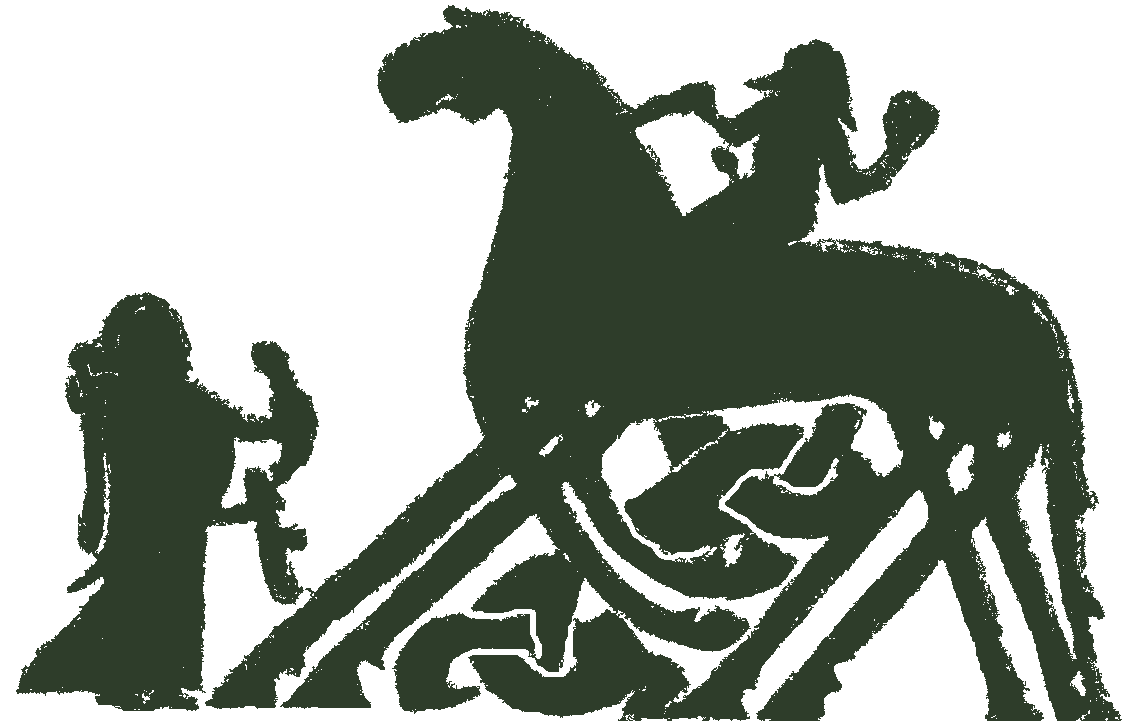in progress
The god Þórr hinn rauðskeggjaði ('red-bearded’) provides a whale for the settlers in Vínland after Þórhallr composes a poem about him. The whale makes everyone ill, and the Christian ask their own God for help instead.
text
[excerpt from] Eir ch. 8b
8b.
Þá fóru þeir út í eyna og væntu að þar mundi gefa nokkuð af veiðum eða rekum. Þar var þó lítið til matfanga en fé þeirra varð þar vel. Síðan hétu þeir á guð að hann sendi þeim nokkuð til matfanga og var eigi svo brátt við látið sem þeim var annt til. Þórhallur hvarf á brott og gengu menn að leita hans. Stóð það yfir þrjú dægur í samt. Á hinu fjórða dægri fundu þeir Karlsefni og Bjarni hann Þórhall á hamargnípu einni. Hann horfði í loft upp og gapti hann, bæði augum og munni og nösum, og klóraði sér og klípti sig og þuldi nokkuð. Þeir spurðu hví hann væri þar kominn. Hann kvað það öngu skipta. Bað hann þá ekki það undrast, kveðst svo lengst lifað hafa að þeir þurftu eigi ráð fyrir honum að gera. Þeir báðu hann fara heim með sér. Hann gerði svo. Litlu síðar kom þar hvalur og drifu menn til og skáru hann en þó kenndu menn eigi hvað hval það var. Karlsefni kunni mikla skyn á hvalnum og kenndi hann þó eigi. Þenna hval suðu matsveinar og átu af og varð þó öllum illt af. Þá gengur Þórhallur að og mælti: "Var eigi svo að hinn rauðskeggjaði varð drjúgari enn Kristur yðvar? Þetta hafði eg nú fyrir skáldskap minn er eg orti um Þór fulltrúann. Sjaldan hefir hann mér brugðist." Og er menn vissu þetta vildu öngvir nýta og köstuðu fyrir björg ofan og sneru sínu máli til guðs miskunnar. Gaf þeim þá út að róa og skorti þá eigi birgðir. | They found little food, but their livestock improved there. After this they entreated God to send them something to eat, but response was not as quick in coming as their need was urgent. Þórhallr disappeared and men went to look for him. They searched for three days and on the fourth Karlsefni and Bjarni found him at the edge of a cliff. He was staring skywards, with his mouth, nostrils and eyes wide open, scratching and pinching himself and mumbling something. They asked what he was doing there and he replied that it made no difference. He said they need not look so surprised and said for most of his life he had got along without their advice. They told him to come back with them and he did so. Shortly afterwards they found a beached whale and flocked to the site to carve it up, although they failed to recognise what type of whale it was. Karlsefni had a wide knowledge of whales, but even he did not recognise it. The cooks boiled the meat and they ate it, but it made everyone ill. Þórhallr then came up and spoke: "Didn't Old Redbeard prove to be more help than your Christ? This was my payment for the poem I composed about Thor, my guardian, who's seldom disappointed me." Once they heard this no one wanted to eat it, they cast it off a cliff and threw themselves on God's mercy. The weather improved so they could go fishing and from then on they had supplies in plenty. |
[status: referenced copy]
commentary
context
This episode occurs in the longer narrative Eiríks saga rauða, probably written in the early 13th century. Some of the settlers in Greenland sail to Vínland but are short of food. Most of the settlers are Christian except for Þórhallr who is described as surly and troublesome, possessing little respect for the Christian faith. It is Þórhallr who composes the poem for the god Þórr.
commentary
(Contributed by Anna Millward.)
tags
Main text: Eiríks saga rauða
Attributes: settlement Landscape Poetry invoking Þórr's help Christian faith ignoring advice Sea-creature
Named things: Þórr
Text sections: Anon Eir 8bV
